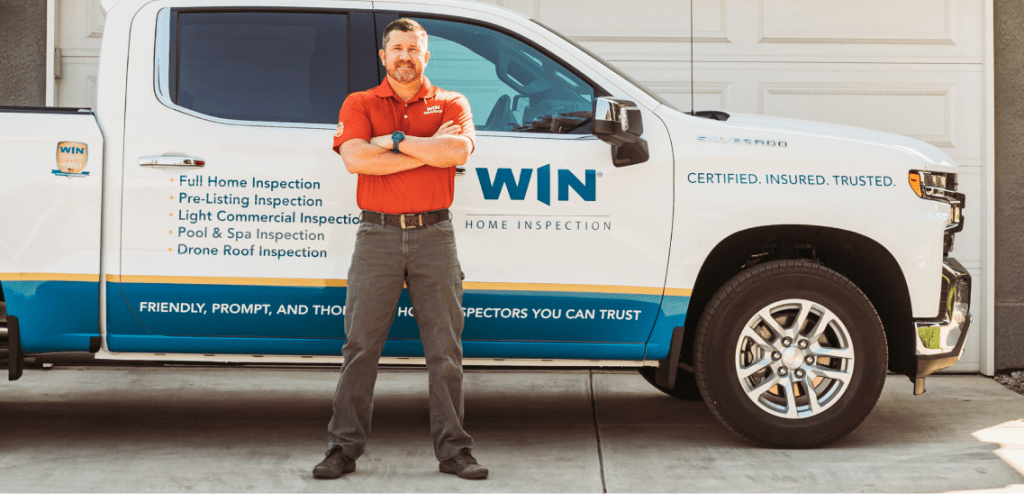Ready to Embark on an Exciting Journey with WIN?
Take the first step toward personal and financial freedom by filling out the interest form. One of our franchise advocates will be in touch with you soon!
July 3, 2024
Have you ever wondered who ensures that the towering skyscrapers and cozy homes we live and work in are safe and sound? Enter the unsung heroes of the building world—construction inspectors! Construction inspectors ensure that construction projects comply with local and national building codes, regulations and standards. They help maintain safety, quality and adherence to plans and specifications, making them indispensable in the construction process.
In this article, we will guide you through the steps to become a construction inspector. You will learn about the necessary education and training, certifications, skills required and tips for gaining practical experience. Whether you are just starting your career or considering a change, these steps provide clear and actionable guidance on how to become a construction inspector.
A construction inspector is a professional responsible for ensuring that construction projects comply with building codes, regulations and specifications. Their primary duties include inspecting various construction sites, including residential, commercial, and industrial projects, to ensure the work meets safety standards and building codes. They verify that construction plans and specifications are being followed and that materials and workmanship meet the required standards. Additionally, construction inspectors maintain detailed records of their inspections, document any violations or issues, and report their findings to relevant authorities or stakeholders. They also ensure that safety protocols are followed on construction sites to prevent accidents and injuries.

Before beginning your journey to become a construction inspector, it’s important to understand what the role entails. These inspectors are responsible for inspecting various aspects of construction, including structural integrity, electrical systems, plumbing, and safety protocols.
Some of their daily tasks include conducting site inspections, reviewing blueprints and building plans to ensure compliance with building codes and safety regulations. They document their findings and write detailed reports, advising construction crews on necessary corrections to maintain project standards and safety.
Key skills required to be a construction inspector include a keen attention to detail, strong analytical skills and good communication abilities. Physical stamina is also essential due to the job, which often involves a lot of walking. Additionally, problem-solving skills are helpful for addressing and resolving issues that arise during construction projects, like unforeseen site conditions, safety hazards and compliance issues.
Becoming a construction inspector offers several benefits, including job stability and high demand in the industry. This role typically comes with a competitive salary and ample opportunities for career advancement. Career advancement opportunities for construction workers include moving into supervisory or management roles, such as a construction foreman, site supervisor or project manager. They can also specialize in areas like safety inspection, quality control or specific trades such as electrical or plumbing work. Additionally, they get to play a crucial role in contributing to public safety and ensuring the quality of construction projects.
To become a construction inspector, you typically need a high school diploma or equivalent. However, higher education can be beneficial, such as an associate or bachelor’s degree in construction management, engineering, architecture, or related field. Some recommended relevant coursework includes building codes, construction technology and safety standards to provide a solid foundation for the role.


Hands-on experience is crucial in this field because it provides hands-on experience and a practical understanding of various construction processes, which is invaluable for identifying issues and ensuring compliance with building standards. Start by seeking entry-level positions in the construction industry that can provide you with practical experience. Some potential positions to start with are construction laborers, carpenter’s assistants, electrician’s apprentices or a plumbing assistant.
Some states require construction inspectors to pass a licensing exam, so check the specific requirements in your state to ensure you meet all necessary criteria. To prepare for state-specific licensing, study the state’s building codes and regulations, take any available prep courses and schedule your licensing exam.
Certification can enhance your credibility and career prospects. The certification process involves meeting the eligibility criteria for education and experience, passing the certification exams, and maintaining the certification through continuing education. There are several certification options available for construction inspectors.
– The International Code Council (ICC) is a member-focused association dedicated to developing model building codes and standards used in the design, build, and compliance process to construct safe, sustainable, affordable, and resilient structures.
– The Certified Construction Manager (CCM) is a certification that demonstrates a high level of expertise and professionalism in the construction industry, covering a broad range of skills and knowledge essential for managing construction projects effectively.
– The National Institute for Certification in Engineering Technologies (NICET) offers certification programs that validate the technical knowledge and skills of engineering technicians and technologists, ensuring they meet industry standards in fields such as construction, transportation, and environmental technologies.
To be a successful construction inspector, you’ll need to develop key skills that go beyond technical knowledge, as these skills enable inspectors to perform their duties effectively.
There are several key technical skills that you should focus on. First, understanding building codes and regulations is valuable for ensuring that construction projects comply with legal standards and safety requirements. Also, knowledge of construction methods and materials allows inspectors to accurately assess the quality and durability of the work being done. Finally, the ability to read and interpret blueprints is vital for verifying that construction aligns with the planned designs and specifications.
There are also some key soft skills you should develop, including strong communication skills that are important for effectively conveying findings, recommendations and corrections to construction crews, project managers, and stakeholders. Attention to detail is also critical for identifying potential issues and ensuring that every aspect of the construction process meets required standards. Moreover, time management skills help inspectors efficiently schedule and conduct inspections, ensuring that projects stay on track. Finally, problem-solving abilities are essential for addressing and resolving issues that arise during construction, ensuring the project progresses smoothly.
Continuous learning and professional development are another important aspect of the skill development process. Staying updated with the latest developments in construction technology and building codes is important for maintaining relevance and effectiveness in the field. Attending workshops, seminars, and training sessions enhances skills and knowledge, allowing inspectors to adapt to new industry standards and advancements, ultimately improving their competency and career prospects.


Once you have the necessary qualifications and experience, you can choose to start your own construction inspection business or apply for jobs with established companies.
Owning a construction inspection business offers numerous benefits that make it an attractive career path for many professionals in the industry. One of the main advantages is the control over your work schedule. As the owner, you have the flexibility to set your own hours, allowing you to balance work with personal commitments, take time off when needed, and manage your workload in a way that suits your lifestyle. This autonomy over your time can lead to a better work-life balance and increased job satisfaction. Another significant benefit is the potential for higher income. Running your own construction inspection business also allows you to build a strong reputation in the industry. By consistently delivering high-quality inspections and exceptional service, you can establish yourself as a trusted expert. A good reputation can lead to repeat business, referrals, and a strong network of professional relationships, further enhancing your business’s success and credibility. One of the most appealing aspects of owning a construction inspection business is the ability to be your own boss. You have the freedom to make decisions about how your business operates, the services you offer, and the clients you work with.
Networking with industry professionals is crucial for finding job opportunities in construction inspection. Building relationships with contractors, architects, and engineers can lead to valuable referrals and insider information about job openings. Attend industry events, join professional associations like the International Code Council (ICC) or the American Society of Home Inspectors (ASHI), and participate in online forums to expand your network.
Using job boards and company websites is another effective strategy. Popular job boards such as Indeed, Glassdoor, and LinkedIn list construction inspection positions, allowing you to search based on location and experience. Many construction companies post openings directly on their websites, too. Specialized job boards like ConstructionJobs.com and iHireConstruction focus on construction careers, providing a targeted search experience.
Preparing for job interviews is essential. Review common questions related to construction inspection, such as your experience with building codes and safety issues and practice your responses. Research the company and role to tailor your answers to the employer’s needs. Mock interviews with friends or mentors can help refine your responses and improve your overall performance.


If you’re interested in becoming a construction inspector, consider starting a business with WIN Home Inspection. WIN is the #1 ranked and the fastest-growing home inspection company in the US, and our diverse service offerings, robust training, and extensive support team make it easy to be successful in residential services.
Joining a franchise offers the benefit of established brand awareness while you maintain independence as a business owner, as well as receive valuable marketing and operations support. Additionally, many franchise owners offer 35+ services, including new construction and pre-drywall inspections, giving you the opportunity to expand your business into new markets.
WIN Home Inspection is the ideal choice for aspiring construction inspection business owners. With comprehensive in-house training across 35+ services, franchise owners receive over 400 hours of classroom and on-the-job training, integrating technical, business, and marketing skills. WIN also offers the largest support team in the industry, providing end-to-end assistance from technical support to strategic business advice.
Choosing WIN Home Inspection means embarking on a successful career in inspection services. With unmatched training, extensive support, a strong industry reputation, ongoing professional development, and robust marketing assistance, WIN is a great partner for entrepreneurs interested in the residential and consumer services, construction, inspection and trade skills industries. To learn more and take the first step toward owning your own WIN franchise, please fill out our interest form.
Becoming a construction inspector involves several key steps that are essential for success in the field. From obtaining the necessary education and certifications to gaining practical experience and networking with industry professionals, each step plays a crucial role in preparing you for this rewarding career. Are you ready to make an impact and build a highly profitable business? Jump into an opportunity with WIN!
Choosing a career as a commercial building inspector is both…Read More
Thinking about becoming a home inspector? Good choice! It’s not…Read More
California’s booming construction industry has created a strong demand for…Read More
Take the first step toward personal and financial freedom by filling out the interest form. One of our franchise advocates will be in touch with you soon!